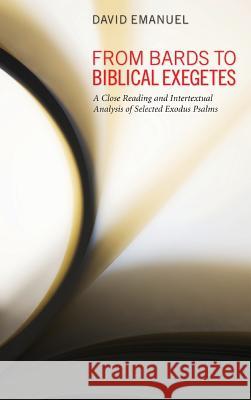From Bards to Biblical Exegetes » książka
From Bards to Biblical Exegetes
ISBN-13: 9781498256766 / Angielski / Twarda / 2012 / 314 str.
From Bards to Biblical Exegetes
ISBN-13: 9781498256766 / Angielski / Twarda / 2012 / 314 str.
(netto: 283,62 VAT: 5%)
Najniższa cena z 30 dni: 293,74
ok. 16-18 dni roboczych.
Darmowa dostawa!
Description: A cursory glance through the Psalter reveals numerous allusions to events in Israel's literary history. While a range of literary and oral sources were obviously available to psalmists, the relationships between these sources and the psalmists' final work are more obscure. Concerning these relationships, numerous questions remain unanswered: How strictly did the psalmists replicate their sources? What kinds of alterations did they make (additions, omissions, etc.)? Did they alter the meaning of their sources in their own compositions? Departing from the more classical approaches to researching the psalms--engaging in the determination of Sitz im Leben and Gattungen--this intertextual study addresses the aforementioned issues by focusing on a group of psalms associated with Israel's exodus tradition (105, 106, 135, and 136). Through a detailed comparison of lexical correspondences between the psalms and other biblical texts, together with a relative dating of each psalm, the study identifies literary sources employed by the psalmists. It additionally includes a close reading of each psalm to establish the unity and meaning of each composition. Emanuel then analyzes and categorizes lexical variances between each psalm and its sources, providing potential explanations for alterations found between the two, and revealing how the psalmists reinterpreted their biblical sources. Endorsements: ""David Emanuel's very useful study provides considerable insight into the intertextual relationships between the Psalms and the pentateuchal narratives as well as the means by which ancient Judah interpreted and learned the accounts of its foundational history."" --Marvin A. Sweeney Professor of Hebrew Bible Claremont Lincoln University and Claremont School of Theology ""Dr. David Emanuel examines the use of the exodus motif in selected Psalms of the Psalter. In this scholarly and insightful examination, the reader sees how the psalmist reutilizes and reshapes earlier biblical historical events for purposes of worship and praise. This book provides an excellent model of intertextual and diachronic analysis for scholars and serious Bible students. I heartily recommend this book to all "" --Cleotha Robertson Assistant Old Testament Professor Alliance Theological Seminary (New York City) About the Contributor(s): David Emanuel is Assistant Professor of Old Testament at Nyack College in Manhattan."
Description:A cursory glance through the Psalter reveals numerous allusions to events in Israels literary history. While a range of literary and oral sources were obviously available to psalmists, the relationships between these sources and the psalmists final work are more obscure. Concerning these relationships, numerous questions remain unanswered: • How strictly did the psalmists replicate their sources? • What kinds of alterations did they make (additions, omissions, etc.)? • Did they alter the meaning of their sources in their own compositions? Departing from the more classical approaches to researching the psalms--engaging in the determination of Sitz im Leben and Gattungen--this intertextual study addresses the aforementioned issues by focusing on a group of psalms associated with Israels exodus tradition (105, 106, 135, and 136). Through a detailed comparison of lexical correspondences between the psalms and other biblical texts, together with a relative dating of each psalm, the study identifies literary sources employed by the psalmists. It additionally includes a close reading of each psalm to establish the unity and meaning of each composition. Emanuel then analyzes and categorizes lexical variances between each psalm and its sources, providing potential explanations for alterations found between the two, and revealing how the psalmists reinterpreted their biblical sources. Endorsements:""David Emanuels very useful study provides considerable insight into the intertextual relationships between the Psalms and the pentateuchal narratives as well as the means by which ancient Judah interpreted and learned the accounts of its foundational history.""--Marvin A. SweeneyProfessor of Hebrew BibleClaremont Lincoln University and Claremont School of Theology""Dr. David Emanuel examines the use of the exodus motif in selected Psalms of the Psalter. In this scholarly and insightful examination, the reader sees how the psalmist reutilizes and reshapes earlier biblical historical events for purposes of worship and praise. This book provides an excellent model of intertextual and diachronic analysis for scholars and serious Bible students. I heartily recommend this book to all!""--Cleotha RobertsonAssistant Old Testament ProfessorAlliance Theological Seminary (New York City)About the Contributor(s):David Emanuel is Assistant Professor of Old Testament at Nyack College in Manhattan.











